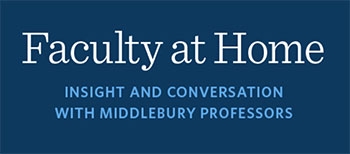Faculty at Home
Join some of Middlebury’s expert and engaging faculty members for interactive talks—from home.

Faculty at Home extends Middlebury’s academic reach to our community around the world. This webinar series invites you to engage in the digital space, to stay connected with faculty members, with big ideas, and with each other.
Moderated by Caitlin Knowles Myers, John G. McCullough Professor of Economics, Sarah Stroup, professor of political science, and Bert Johnson, professor of political science, this series stimulates thought-provoking online conversations for the benefit of the Middlebury community far and wide. Faculty at Home is supported by numerous offices at Middlebury including the Office of the Provost, Advancement, Media Services, and Communications.
Generally, we open up the webinar 5 – 10 minutes ahead of the start time. This offers attendees the chance to let everyone know (via Zoom chat) that they are present and where they are joining from. Zoom settings only allow attendees to see the chat activity from the time they log in, so if you’d like to say hello, consider logging in early.
Recordings are posted about two weeks after the live event.

